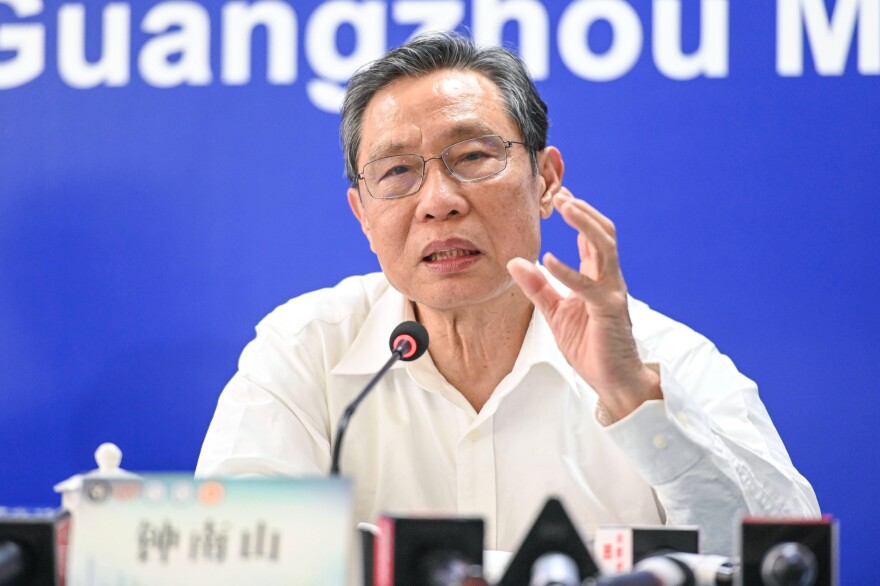In February, China's leader Xi Jinping declared himself the "supreme commander" in a war against the new coronavirus. But the public face of China's efforts to contain the outbreak is not Xi: it is an 83-year-old, weight-lifting doctor.
Dr. Zhong Nanshan has long been a household name in China. The pulmonologist holds no formal office — but over the past three months has become the face of China's virus containment efforts, cutting through public confusion and online disinformation about SARS-CoV-2.
In China, "there is a lot of a sense of mistrust and in everything, just a kind of societal desperation," said , a scholar of global communications at Georgia State University.
Similar scientific figureheads have emerged in other countries now battling their own outbreaks of COVID-19. In Germany, virologist Dr. Christian Drosten, whose podcast about the new coronavirus has made him a public celebrity. In Hong Kong, infectious disease specialist Dr. Gabriel Leung is a regular fixture on mainstream news outlets.
"These figures have kind of come to represent something that's honorable, sincere, scientific and unbiased," said Repnikova.
Dr. Zhong also draws comparisons to Dr. Anthony Fauci, director of the National Institute of Allergy and Infectious Diseases and a prominent adviser to the federal government on its COVID-19 containment efforts. Like Fauci, Zhong, who is a former track and field star, is a fitness buff – and is is widely seen as a reliable source of information in contrast to the some government figures.
"There's a parallel in both countries in that manner," said Dr. Jeffrey Koplan, a vice president of global health at Emory University, who worked alongside Zhong in the aftermath of the 2003 SARS epidemic. "In many instances, politics can play a role that's helpful by mobilizing resources and helping the public health effort in a very positive way. But it also can be a hindrance."
On January 20, it was Zhong who confirmed in a state television interview that the new coronavirus could spread from person to person, warning the public that the virus may be highly contagious.
The revelation was a critical piece of information local bureaucrats and public health officials denied for weeks, citing lack of evidence. That and other cover-up measures delayed China's efforts to contain COVID-19 for at least a month after health authorities became aware of a mysterious new virus.
When Dr. Li Wenliang, a whistle-blowing doctor, later died himself of the coronavirus, the Chinese government launched an investigation into why he had been first reprimanded by local police for warning other doctors about a strange kind of pneumonia. They concluded that authorities in the Chinese city of Wuhan, where the virus began, acted "inadequately" when they warned Dr Li to stay silent. For many in China, that was not enough of an apology.
Instead, it was Zhong Nanshan who channeled public grief when he openly mourned Li's death in a taped interview with Reuters. "He's the hero of China," said Zhong, choking back tears, "I'm so proud of him, he told the truth, back in December."
The roots of Zhong's fame date back to 2003. That's when he made his name during the SARS outbreak, during which he developed a controversial steroid treatment that cured many SARS patients but left some with debilitating bone issues. In an interview with the Southern Metropolis Daily, he asked: "Was it more important to save lives or prevent this problem?"
Zhong also proved himself to be willing to confront authority. Infamously, he openly contradicted Chinese officials' repeated assurance that the SARS outbreak was under control. "The virus is still spreading, so how can we say it's under control?" he blurted out at an April 2003 press conference.
"Honesty is what matters. The public needs to know the truth; concealing what happens may lead to a panic rather than to social stability," Zhong wrote three years later in a paper describing lessons learned from the SARS epidemic.
"He was widely viewed as a hero precisely because he was willing to speak out to tell the truth," says Yanzhong Huang, a senior fellow for global health at the Council on Foreign Relations, who spoke to NPR.
Since 2003, Zhong has been lionized in numerous state-directed documentaries and profiles. Snippets of his strenuous workouts — a minimum of 45 minutes daily of weight training and cardio — have gone viral. "His good revolutionary capital is a result of many years of continued physical training," a 2008 documentary produced by China's state broadcaster proclaimed.
Others who've collaborated with him over the years told NPR how impressed they were. "He was such a nice person. He was charming, and he was always courteous and polite and listened, and he was very authoritative," says Dr. Sian Griffiths, now an emeritus professor at The Chinese University of Hong Kong. She remembers working with Zhong in 2003 to examine Hong Kong's readiness for another SARS-like epidemic: "He was a great favorite of all of us. We were very pleased to have him as a member of the committee."
But even Zhong Nanshan, with his impeccable scientific and political credentials, cannot avoid being seemingly politicized by China's propaganda machine.
At a state press conference in February, Zhong said although the virus first appeared in the Chinese city of Wuhan, "it may not have originated there."
His comments are now widely used to support a popular state disinformation campaign that the U.S. military brought the virus to China. A foreign ministry spokesperson Zhao Lijian publicly promoted this conspiracy, which China's ambassador to the U.S. has called "crazy."
During a March press conference, Zhao cited Dr. Zhong when stating that "the epidemic was first reported in China but did [sic] not necessarily originate in China."
Zhong did not respond to NPR's requests for comment.
Copyright 2021 NPR. To see more, visit https://www.npr.org. 9(MDAxODg3MTg0MDEyMTg2NTY3OTI5YTI3ZA004))



